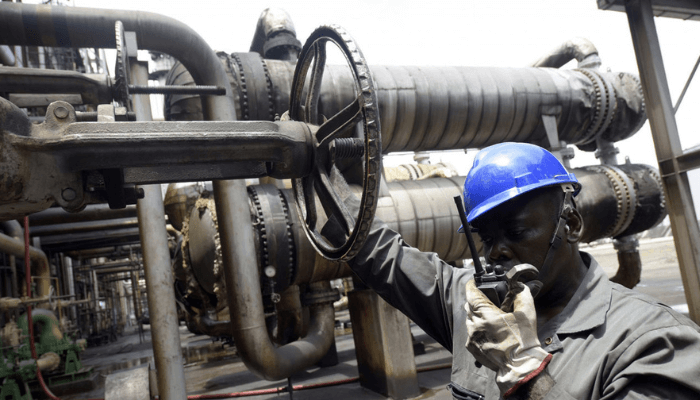Petroleum marketers explain that filling stations still sell Premium Motor Spirit, or petrol, above N1,000 per litre because they are yet to exhaust their old stock.
They note that the previous stock was purchased at N970 per litre, and many stations still have it in their tanks.
It was earlier reported that on December 19, 2024, the Dangote refinery slashed the ex-depot price of its petrol from N970 to N899.50 per litre.
In a similar move, the Dangote Refinery disclosed its partnership with MRS Petrol Station to sell petrol at N935 per litre across its retail outlets nationwide.
The President of Dangote Industries Limited, Aliko Dangote, explained that the reduction in PMS prices was mainly influenced by the complex dynamics of market forces.
This sparked what some referred to as a price war in the downstream sector, prompting the Nigerian National Petroleum Company Limited to lower its ex-depot price to N899 per litre.
Following the price cuts, NNPC retail outlets in Lagos and surrounding areas have updated their pump prices to N925 per litre.
Similarly, some major marketers have been compelled to sell petrol for less than N1,000 per litre, with prices ranging from N990, N980, N950, to N935.
However, it was gathered that despite the price cuts, many filling stations are still selling petrol for over N1,000 per litre.
In many filling stations across Lagos, Ogun, and other states, petrol is still being sold for as high as N1,070 per litre.
While some stations have made adjustments, prices remain around N1,050, N1,030, N1,010, or N1,000 per litre as of Wednesday.
Commenting on the situation, the National Vice President of the Independent Petroleum Marketers Association of Nigeria, Hammed Fashola, said that marketers are still grappling with the old stock they purchased at the previous price.
Fashola emphasized that the price reduction cannot take effect immediately.
“Some of our members have old stocks. So, there’s no way they can just start immediately. It’s only when they go back to the market to purchase at the lower price, then they will start selling at the new price. If you look around, as of yesterday, I see many of our members have come down to N940 or N935 in Lagos. So, by next week, you will see more of them. Once they finish with their old stock, they will start selling at the reduced rate,” Fashola stated.
According to him, marketers are aware of the competition in the market, and no one wants to be left behind.
“You cannot deceive yourself. This is competition. This is what we have been asking for. So, if you like, put your fuel at N1,500, nobody will buy it. So, it’s not deliberate. If you are still seeing a few of us that are still selling at N1,000, it is because of the old stock. Once they finish with their old stocks, they will start selling at the lower price,” he emphasised.
When Fashola was reminded that filling stations would not have kept the old price if the price had increased, he responded that the situation was different, as they were still working with existing stock purchased at the previous price,
“Well, as a businessman, your purpose is to remain in the business. So, if you make a huge loss, you can go down. That’s just it. It is natural,” he said.
However, the Vice President of IPMAN reiterated that many marketers are now incurring losses due to the price reduction.
“Even at that, some of us still make losses. I can tell you that some people when their stock gets to a level that they can bear the loss, they will reduce their prices. I can take myself an example. Some of my stations yesterday, when we looked at our stock, maybe we had 20,000 litres in some of our stations, we calculated our losses and I thought it was minimal. So, we reduced our prices despite being the old stock.
“That’s the truth. That’s because people are running away. That’s the reality. Many of our members are doing that too. When they calculate the loss and they can bear this loss, they fix a new price,” he stated.
While acknowledging the positive impacts of deregulation, Fashola also pointed out the negative effects it brings.
“The negative effect of deregulation is like what we are just discussing. If you buy a product at maybe, N1,000 today, and tomorrow, the price goes down to N950. You’ve already recorded a N50 loss. You buy a product today from a depot and the following day, the price goes down. Have you finished that stock? It’s not possible. That is the negative aspect of it. Therefore, you have to be careful. You have to go with information before you make your purchases, even before you make your imports.
“And there are some factors you have to consider. That is the exchange rate and the crude oil price. Those are the major factors that determine the price of petroleum products. So, you have to be futuristic. You have to be able to project very well before you make your move. Otherwise, you enter into trouble. That is one of the negative aspects of deregulation. But, we have to cope with it,” he noted.
The marketer expressed concerns over the financial challenges faced by those in the business following the removal of fuel subsidies.
With the price of PMS increasing from N200 to N1,000 per litre, Fashola revealed that marketers are struggling to do business, especially as bank interest rates rise monthly.
“When you go to the bank, you know the interest you will pay. So, which way? We need more money to remain in business–more money, but with a little margin. This is really impacting on us. But we all call for deregulation and we have to live by it. We don’t have an option,” he added.











